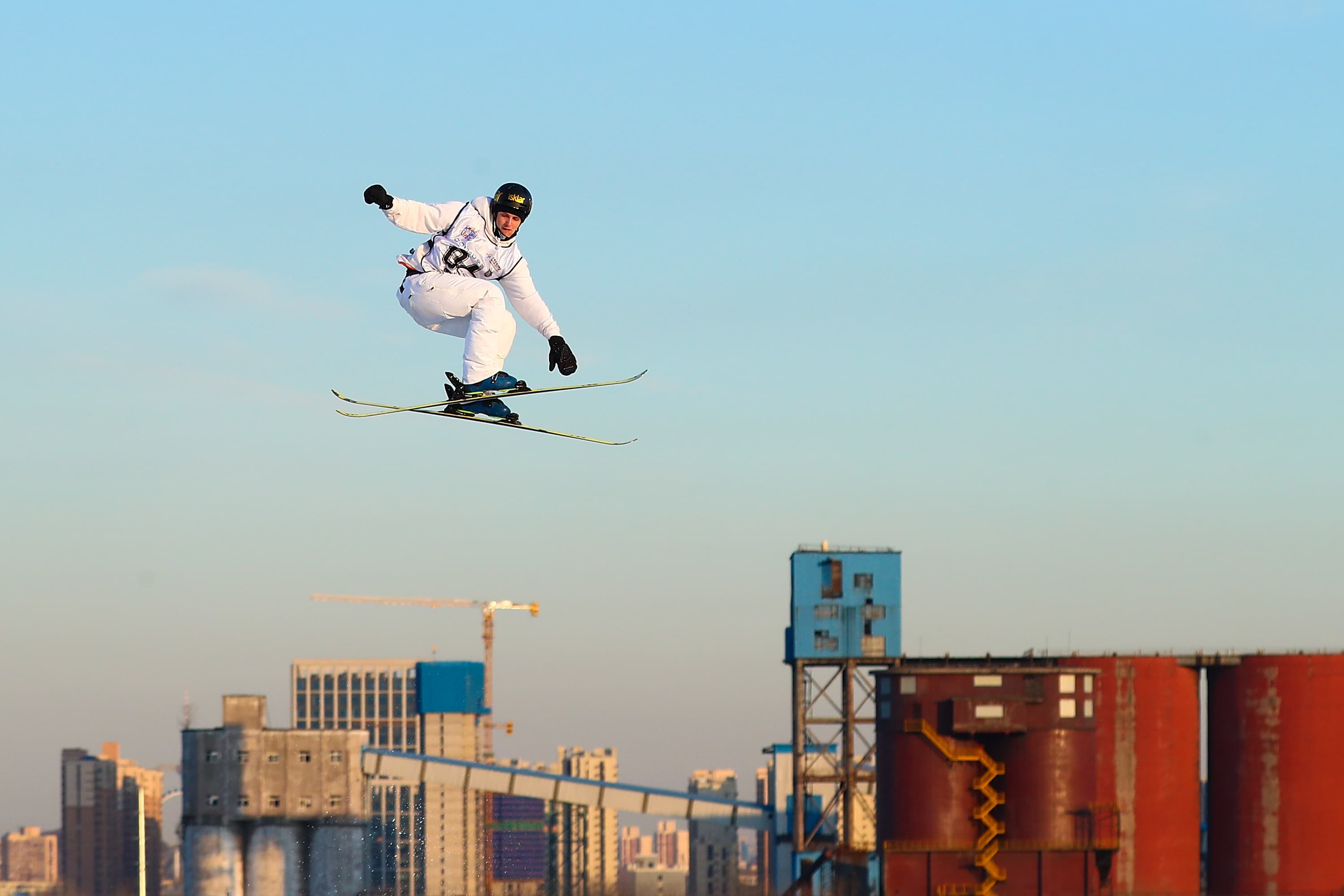Birk Ruud of Norway competes the Men’s Freeski Big Air finals during the 2019 Air+Style Beijing FIS SnowBoard World Cup on December 14, 2019 in Beijing, China.
Lintao Zhang | Getty Images
Two Chinese cities — namely Beijing and Zhangjiakou — witnessed a burst of activity in winter sports investment after China was named the host of the 2022 Winter Olympics.
Since 2015, when it was announced that Beijing and its surrounding cities would play host in 2022, the Chinese government has been pushing for the development of winter sports. Some incentives include dishing out tax exemptions and increasing access to resources, as it hopes to attract 300 million people by 2022.
By the end of last year, the area developed for ski resorts in Zhangjiakou had 169 routes stretching over 162 kilometers and more than 10,000 pieces of equipment available for rental. Together, the seven ski resorts in the same city can now host more than 50,000 people in a day, according to municipal government reports.
China playing host to the 2022 Winter Olympics has given winter sports a boost in the world’s second-largest economy. The number of visitors to China’s ski resorts has tripled from 5.5 million in 2009 to 15.1 million in 2016, according to a report by legal and accounting advisory Dezan Shira & Associates.
Investment flowing in
Beijing Organizing Committee for the 2022 Olympic and Paralympic Winter Games (BOCOG) host a Global Recruitment Launch event for volunteers of the Beijing 2022 Winter Games at the Shougang Park, Shijingshan District, Beijing on December 5, 2019.
Evelyn Cheng | CNBC
According to China Tourism Academy’s 2018 China winter tourism report, Zhangjiakou city — which will co-host the Winter Olympics with Beijing and Yanqing — is one of the top 10 winter destinations in the country.
Considered a fourth-tier city, Zhangjiakou was not expected to come under the spotlight. In fact, just a few years ago, Chongli district in Zhangjiakou was surrounded by muddy roads and underdeveloped villages, among a few hills covered completely in snow during winter.
Still, challenges remain.
A November travel report by the New York Times revealed that the Chinese ski resort town may not be ready for guests yet, as the city is “cold enough for snow to stick around in the winter, but that snow has to be blasted out of machines over a land parched by droughts.”
The Canadian city of Vancouver, which hosted the 2010 Winter Olympics, was also hit with the same problem, which led to the city allocating much of its $2 billion budget to producing artificial snow.
Australian Olympics snowboarder, Scotty James, told CNBC’s “Street Signs” in December that the most important thing for athletes is the consistent temperature.
“Whether if (the snow) is man-made or natural, that doesn’t really matter, what’s more important is the temperature, and it’s definitely cold enough here in China,” said James.
Recruiting talent
In 1996, China had only 11 ski resorts in the country. Twenty years later, the country had 646 ski resorts, according to EU SME Centre, a research center funded by the European Union which has partnerships with six European countries’ business councils in China.
The market size of the skiing industry in 2022 is expected to be 3.5 billion euros ($3.97 billion) — an increase of more than 480% from 2015, according to a 2018 report by the EU SME Centre.
“China officially has the world’s largest beginner market for winter sports,” wrote legal and tax advisory Dezan Shira & Associates’ Peter Upton in a September report.
“I would draw a line here between the hardware side (buildings, equipment, etc) and the software side (programming, athlete development infrastructure, etc) — neither market is saturated — but there is much more need on the software side,” Mark Simon, a consultant for the China Hockey Group and Chinese hockey club Kunlun Red Star, told CNBC in an email.
Beijing is finding different ways to promote winter sports, and is seen as trying to push winter sports mainstream.
For one, ice hockey in China has seen tremendous growth in fan base and participation since Song Andong, the first China-born player, was drafted to play in the U.S. National Hockey League.
In October, the Beijing Olympic City Development Association and the International Data Group co-hosted the World Winter Sports Expo 2019 to educate the masses on the various sports and attract investors into the market.
This picture taken at the Yanqing sports school in Beijing.
Wang Zhao | AFP | Getty Images
China is also aiming to recreate boot camp style specialty school for winter sports. According to a 2016 report published by the National Development and Reform Commission, it aims to build 5,000 such specialty schools by 2025.
The Ministry of Education, under its 2025 development plan, wants to attract 50 million athletes, coaches, judges and students. It hopes that by 2020, the winter sports industry in China can reach 600 billion yuan ($85.5 billion) in revenue, and hit 1 trillion yuan by 2025.
Simon said there are specialized schools which are publicly funded in China’s northeastern provinces for professional hockey players.
“Their goals are to create future players, however, there are some questions about the overall education,” said Simon. He added that Chinese children are also getting more exposure to winter sports, through domestic TV channels and some elementary school curriculum, but he’s concerned that he’s not seeing a long-term development path for those who excel in them.
Chinese young athletes are often recruited to enroll in what are called specialty sports schools, and are treated as “state property,” Simon said. They train rigorously, often cutting down on academic studies in the hopes that one day, their hard work would pay off, he added.
